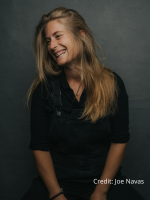In 2005, Bob Wells decided to start farming in Eastham.
He started planting things and very quickly realized that he was planning on starting a farm in basically a pile of sand.
He didn’t know much about soil fertility at the time, but Bob knew he had to do something, and he started reading. His wife works at the Eastham public library and she brought home a book called 1491 about Indigenous cultures and land use in the Americas before colonization.
"And there's a few paragraphs in one chapter of that book about soil called Terra Preta that was discovered in the jungles along the Amazon River that is some of the most fertile soil in the whole world," Bob said.
This caught Bob’s attention. He learned that terra preta is a human-created soil, built intentionally by Indigenous Amazonian communities by adding charcoal and pottery to enhance the fertility of local clay. Clay is obviously different from Cape Cod sand but both soils are nutrient-poor and low in organic matter, and Bob wondered if the fire-based techniques used in the Amazon might also help his land.
"I thought wow, I gotta try that 'cause I know how to make charcoal and I went out and I made some and I tried it on a row of my famous Eastham turnips and it more than doubled the size of the turnips that grew, 'cause I experimented side by side and it totally blew my mind."
When a fire burns it leaves behind different components depending on how much oxygen it gets and how hot it is, but two of the main byproducts are ash and charcoal. In the Amazon this charcoal — also called black carbon, pyrogenic organic matter, or biochar — is created by burning organic matter like brush and kitchen scraps with low amounts of oxygen, essentially letting fires smolder and then either leaving the charred matter in agricultural fields or transporting it to them.
"And one of the big keys of Terra Preta and biochar is that it doesn’t decay," Bob said. He added, "You’ve actually caused it to take on a form, that form of carbon that doesn’t break down, it doesn’t break down because it’s not edible by anything it just stays there but it has all these other attributes that really help the soil. So in the process of not breaking down you get that very thin layer but you do that every year for generations, potentially centuries or even millennia, and you’ve got a buildup of this black, rich soil."
Scientists believe that this actually mirrors the way Midwestern mollisols and similarly rich grassland soils all over the world have been formed — through repeated fires leaving black carbon on the landscape. This is fascinating for so many reasons — not only because rich soils are important for food production, but also because of the longevity of biochar.
"And that longevity creates a situation we’re taking some of the plants, some of the body of that plant or the tree or whatever we’re using or the grass and we’re turning it into a recalcitrant form of carbon that stays in the soil and doesn’t break down," Bob explains.

"So we’re sort of breaking into the natural carbon cycle at that point and taking it out of the cycle so it’s not going to decay and turn back into co2 and methane and the things that are created when you, for instance, just let a log rot in the forest."
It's not true that biochar never breaks down — but it takes hundreds or even thousands of years to decompose. This means that creating biochar effectively slows down the carbon cycle, which has surprising implications for climate change, and is also incredibly important when we think about food production both on small local farms like Bob’s and large Midwestern operations in the United States.
"You know now we don’t burn the plains, so now we’re mining that soil for its nutrients, you know, America's built on that practically the food that we've grown out there and continue to grow in those areas is just it feeds all of us in large part of the world."
Since learning about biochar, Bob Wells has traveled to the Amazon to see the riverside communities where terra preta originates. But he hasn’t only traveled to the Amazon — he’s also expanded his focus beyond his own land to start a company that helps create biochar production systems with farming communities around the world.
—
The company Bob created is called New England Biochar and consults all over the world.








